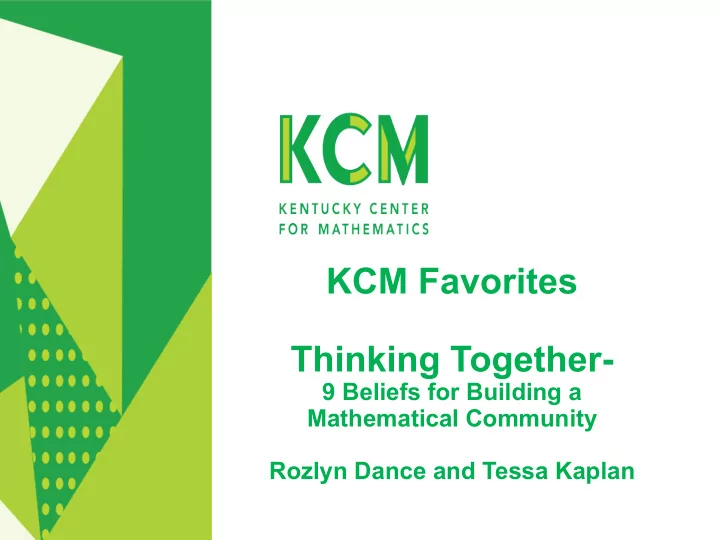

KCM Favorites Thinking Together- 9 Beliefs for Building a Mathematical Community Rozlyn Dance and Tessa Kaplan
Welcome! Your host Kelly DeLong Executive Director Kentucky Center for Mathematics delongk1@nku.edu
KCM Website www.kentuckymathematics.org
About the Authors https://www.heinemann.com/products/e09818.aspx
KCM Favorite by Rozlyn Dance and Tessa Kaplan https://www.heinemann.com/products/e09818.aspx
KCM Favorite
Why I Love This Book
A Respectful Community of Learners Posters available as a free download at the publisher’s site. https://downloads.heinemann.com/thinking-together-posters
A Respectful Community of Learners “When a respectful atmosphere exists in the classroom, students feel more comfortable sharing their mathematical thinking with one another, taking risks, and tackling new ideas.” https://bit.ly/3exzIRb
A Respectful Community of Learners Using read alouds to help teach respect.
Everyone has a right to learn Teaching moves and routines that support a student’s right to learn: • Private Think Time • “Don’t steal my thinking” • Turn and Talks • How to Help a Partner • Revoicing/Retelling • Honoring All Students’ Thinking • Revising Thinking
We respect the ideas of others “As teachers, we model respectful behavior with our tone of voice, our consideration for everyone, and most importantly our celebration of differences with our classroom.” Authors Dance and Kaplan
We respect the ideas of others Respecting each other: • Respectful listening • Respectful disagreements • Explaining disagreements • Honoring mistakes • Modeling • Praise • Public Records • Sentence Stems
We respect the ideas of others Sentence Stems • I respectfully disagree because… • I solved the problem differently because… • I like how you _____because_____ • I’m having trouble understanding you ___. Could you explain it in a different way?
We respect the ideas of others How do you develop classroom culture where...
Building Brave Mathematicians
Building Brave Mathematicians Using read alouds to encourage confidence, perseverance, and resilience.
Building Brave Mathematicians Using read alouds to encourage confidence, perseverance and resilience.
Building Brave Mathematicians Using read alouds to encourage confidence, perseverance and resilience. https://www.youtube.com/watch?v=2fZjMYdQjGM
Building Brave Mathematicians KCM challenge for you… Incorporate more read alouds into your classroom to enhance the mathematical culture.
Building Brave Mathematicians When students exclaim, “That’s easy!” “We must remind them that we all learn at different paces and in different ways and just because the problem is easy for one doesn’t mean it is easy for all.” Authors Dance and Kaplan
Building Brave Mathematicians Mathematical Confidence • Perseverance • Valuing Mistakes • Taking Risks • Self-Reliance What does this look like in the classroom? Paint a picture of mathematical confidence.
Great Minds Think Differently
Great Minds Think Differently Dance, R., & Kaplan, T. (2018). Thinking together: 9 beliefs for building a mathematical community . Portsmouth, NH: Heinemann. pg 72.
Great Minds Think Differently Be careful with praise. “I really like the way you showed the way you used the cubes on your paper.” “I like how you worked hard to write the sentences that clearly explain the steps you took when you used your doubles strategy.” “This picture shows me exactly what you did to solve the problem.”
Thinking Through Questioning
Thinking Through Questioning Teachers questions generally fit into 3 categories • Questions that clarify and probe for justification • Questions that guide, challenge, and extend • Questions that assess understanding
Thinking Through Questioning Questions that clarify and probe for justification- “How did using a ___ (model) help you solve the problem?” “What tool did you use? How did it help you?” “What in the problem told you that?”
Thinking Through Questioning Questions that guide, challenge and extend- “I saw you use a number line yesterday. Would that tool help you today? Why? Why not?” “Do you think one strategy is more efficient that another in this problem? Explain.” “Can you create a similar problem that I can give to the class?”
Thinking Through Questioning Questions that assess understanding- “Why did you use this operation?” “I saw that some of our classmates had ____ as their answer. What do you think they did to get that answer?” “What does the number ___ represent in the problem? Explain your thinking.”
Thinking Through Questioning
Thinking Through Questioning Teacher Talk Moves to Encourage Questioning • Does anyone have questions for _________? • What questions can you ask _____ to help yourself better understand (his/her) thinking? • Can you tell me more about ___?
Great Minds Think Differently Using read alouds to encourage thinking differently.
KCM Favorite Which belief is most important to you? Type in chat box or unmute mic and share with our friends. https://www.heinemann.com/products/e09818.aspx
KCM Favorite https://www.heinemann.com/products/e09818.aspx
KCM Favorite
Follow Us! www.kentuckymathematics.org @KyMath @KyCenterforMath
KCM is here to support you! Contact me Kelly DeLong Executive Director Kentucky Center for Mathematics delongk1@nku.edu
Recommend
More recommend